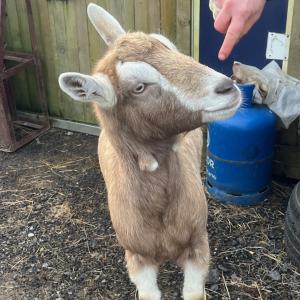
By Vet Ben Dustan
Urolithiasis is a condition in which small calculi, often referred to as ‘stones’ or ‘crystals’, form in the urinary tract of goats and is closely linked to the diet. These small stones form in the urinary system, usually within the kidneys and bladder, and are excreted in the urine. Male goats, and particularly those that have been castrated whilst very young, have much narrower urethra (the tube that empties the bladder), and the stones can be become trapped and block normal urine output.

The urinary calculi or stones are precipitates of minerals. In goats the stones are usually phosphate salts, especially calcium phosphate or struvite.
Goats with urolithiasis will often strain to urinate and vocalise with pain. They sometimes try to kick their abdomens and often arch their backs upwards before crouching. Male goats will also often have dried crystals around the urethral opening or on the hairs of the prepuce. As the pressure builds from the blockage, if undetected, it will eventually rupture the urethra and/or the bladder, and the goat will rapidly deteriorate and die.
Preventing urolithiasis has a lot to do with our management of goats, especially how much water they drink and the feeds that they eat. Goats with a low daily water intake and high concentrate feeds / low forage intakes are at much higher risk of stone formation.
Goats can be “fussy” when it comes to water and food. It is essential that their water is always fresh and clean, and that wasted food is removed and replaced daily.
Diet is also really important as it is essentially an excess of dietary magnesium, potassium and phosphorus that results in increased urinary excretion of these elements. These can then combine with urinary ammonium to precipitate into insoluble crystals. We also know that goats on a low fibre diet don’t produce as much saliva, which is naturally high in sodium bicarbonate and phosphorus, so are more susceptible to acidic stomach conditions which can predispose to these crystal formations as well as other dietary complications such as acidosis.
Treatment for urinary obstructions should be undertaken by a vet and if you suspect your goat has urolithiasis it should be seen as soon as possible. The sooner treatment begins the greater the chances of breaking down the stones to enable the goat to pass them. If it is a partial blockage your vet may be able to remove the obstruction using spasmolytic and muscle relaxant drugs.
We can also alter feed and water management to ensure stones are not being formed, and to help break down stones that exist. This is often by increasing the amount forage fed, particularly hay; ensuring clean water intake is maintained and by adding ammonium chloride that helps to chemically breakdown many common stones. If the obstruction is complete and the goat cannot pass any urine then surgery becomes necessary.
However, in the case of a full obstruction and possible rupture (urethra and / or bladder) treatment is often disappointing and your vet may well have to advise euthanasia on welfare grounds.
A recent case involved a goat who had been castrated as a baby. In early December he began having difficulty urinating, was vocalising in pain and arching his back.
Treatment included muscle relaxants and anti-spasmodic drugs to try and relax the urethra as well as significant pain relief, antibiotics to cover against urinary tract infections and ammonium chloride orally to try and dissolve any crystals.
It took 24 hours for even intermittent drops of urine to be passed.
By the end of January, he appeared fully recovered. He remains on low doses of daily ammonium chloride to prevent further crystal formation and continues to do well.